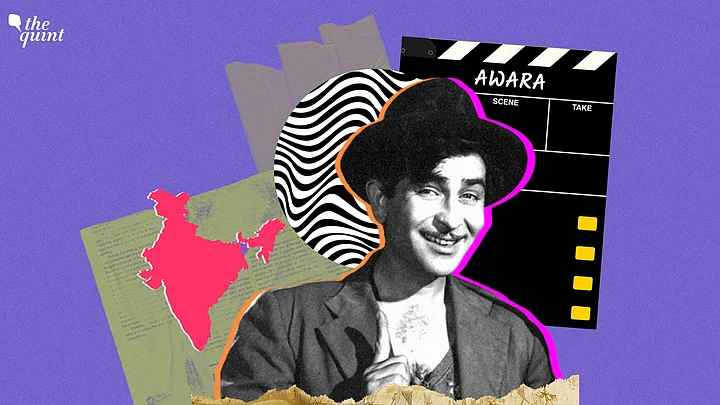I have lived a life and inherited a legacy of constantly being on the move—a state of mind that Spivak has referred to as being in a state of permanent roots in the air. There are only two things that have remained constant in this journey—Pashtunwali as a life truth and Raj Kapoor’s cinema as a worldview.
Mine has been a childhood raised under strict Islamisation and militarism in a garrison town of Pakistan in the public space and a private world where my generation had its own baggage of gender and cultural politics.
Somewhere along the years, I found my hands on a video cassette of Raj Kapoor’s Awaara (1951). As the film began I leaned back in my seat and told my grandfather conversationally, “I hear the father and son actors here are like royalty, India’s film dynasty."
How Raj Kapoor Influenced My Socio-Cultural Views
My grandfather had spent the best part of his life in the British Indian and later Pakistani army and had never questioned the years fighting what we have always believed was someone else’s war. But this was the first time I saw him bemused “How? How could this be? He (Prithviraj Kapoor) was a bunker!”
And this is how dear Reader, I went down the rabbit hole, consuming all that I could about a family that showed me what dreams may even come true even if you ran away from college; my love for them is the first step for not following a path predictable and staid.
I will always credit Raj Kapoor’s characters for underwriting my contract with socialism; or rather his Raju in Mera Naam Joker (1970) who introduced us to "Duniya mein ek cheez sher-e-babbar se bhi zyada khatarnak aur darauani hai ... aur woh hai ghareebi aur bhookh" not for us tilting at the windmills of the wild when there was still poverty and hunger.
Before reading the feminist researcher Marilyn Yalom’s (1997) seminal work on the cultural history of the breast (A History of the Breast) which involved Yalom going through 25,000 years of contradictory portrayals of the breast, Kapoor’s Ram Teri Ganga Maili (1985) and other chapters of his filmography had steered me through the "good breast" of reverence and life, and the “bad breast” (read seductive ) of the temptress.
Raj Kapoor set me on the path of Foucault’s 'Nature versus Nature' debate with his father Prithviraj Kapoor playing the upright Judge Raghunath to his Charlie Chaplin-esque little tramp Raj through Sharifo ki aulad hamesha sharif hotee hai aur chor daakuo ki aulad hamesha chor daaku (Awaara,1951).
Cross-Border Relations and a Unique Universality..
Yes, credit is due to Khwaja Ahmed Abbas, the screenwriter of many of Raj Kapoor’s films that form part of my social and political consciousness. But then, this is what Raj Kapoor did for us— despite the "rukavat beliye khed hai"(sorry for the intermission), he is the conduit to what I will always believe, is the soul of India.
He is the hook that reeled us towards Mukesh. Mukesh to Kapoor to Abbas; the Matryoshka souls that voice immortal India, and what it can be. "Maana ke abhi tere mere aramaano ki kimat kuch bhi nahi Mitti ka bhi hai kuch mol magar insaano ki kimat kuch bhi nahi Insaanon ki izzat jab jhuthhe sikko me na toli jayegi Woh subah kabhi to aayegi Woh subah kabhi to aayegi."(Phir Subah Hogi,1958).
I have had the privilege of living and walking the lanes of cities that are familiar to his tread. I have witnessed the parallel streetscapes that emerge if you were to follow the route of a chubby-cheeked child on the prowl for treats, running in and out of Dabgari Gate houses in Peshawar snatching something to eat from a table.
To have sat at a table at Lintot Cafe on Murree's Mall Road which as Madhu Jain’s history of the first family of Indian cinema narrates has been witness to many a Raj Kapoor attack on plates of chips doused in ketchup, and I have looked with reverence at the gate to RK Studios in Chembur.
Raj Kapoor may have never been able to complete his ode to cross-border love—Henna; but every day he lived up to what Madhu Jain quotes Kapoor’s teacher about the family. "A Pathan is both Muslim and Hindu, and yet he is neither—he is simply and solely a Pathan." Kapoor was simply Kapoor; spanning borders and definitions.
The Inimitable Star Who Bore the Essence of a Common Man
Raj Kapoor’s filmography is a time capsule and tells a tale of us — of the way we once were, what we ate and drank, what we wore, how we laughed and cried, what we watched—hell 'Phir Subah Hogi' is connected to a beautiful "electoral rags to riches BJP victory" story if you look it up.
His oeuvre looks over who we fell in love with, our language of love, and those whom we could never dare love. Drawing parallels to Manto, I wonder if his samadhi has the question “Here lies Shrishti Nath Kapoor, and with him lie buried all the secrets and mysteries of the art of being the ringmaster... Under tons of earth, he lies, still wondering who among the two is Great Showman: God or He."
(Aneela Babar is the author of We are all Revolutionaries Here: Militarism, Political Islam and Gender in Pakistan ( 2017) and a forthcoming memoir on consuming Hindi cinema in Rawalpindi. This is an opinion article and the views expressed are the author's own. The Quint neither endorses nor is responsible for them.)
(At The Quint, we question everything. Play an active role in shaping our journalism by becoming a member today.)
